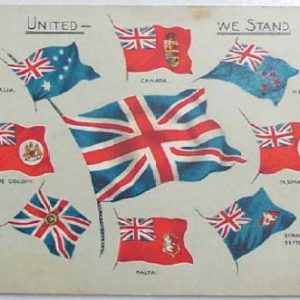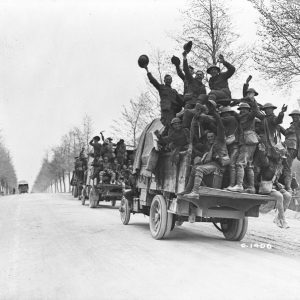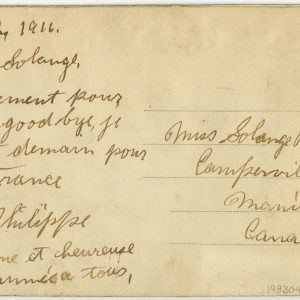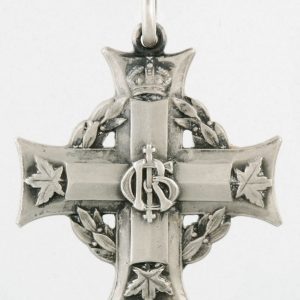Canada’s contribution to the First World War enhanced its autonomy and its stature on the world stage.
In 1914, Canada had a population of about 8 million. When war broke out, it placed a considerable proportion of its people and resources at the disposal of Britain and the Allies. After four years of commitment and sacrifice, Canada gained greater confidence and international recognition.
Canada and the Empire
At the beginning of the 1900s, the British Empire, which included Canada, was at its peak. It covered more than 31 million square kilometres and included one-quarter of the world’s population. Most Canadians, particularly anglophones, took pride in this relationship. Some leading intellectual and political figures — like Prime Minister Sir Wilfrid Laurier — sought greater autonomy for Canada.
Canada Goes to War
When Britain declared war against Germany in August 1914, Canada — as part of the British Empire — was automatically involved. The same applied to Newfoundland, a separate dominion at that time.
Canada made an enormous contribution to the war effort. Over a period of four-and-a-half years, 620,000 men and women enlisted, of whom 425,000 served overseas with the Canadian Expeditionary Force, along with some 6,000 more in the Royal Newfoundland Regiment. At home, many more supported the war effort in factories and fields.
 Patriotic postcardCaption: United We Stand
Patriotic postcardCaption: United We Stand
W.N. Sharpe Ltd., Bradford and London, about 1900
Gift of the Hon. Serge Joyal, P.C.
CMH, Archives, 2012-H0040.14 Canadian soldiers after the Battle of the SommeUnknown photographer, November 1916
Canadian soldiers after the Battle of the SommeUnknown photographer, November 1916
Library and Archives Canada, PA-000839, MIKAN 3521804 Gas Attack, Flanders, 1915Alfred Bastien, 1915
Gas Attack, Flanders, 1915Alfred Bastien, 1915
CWM, Beaverbrook Collection of War Art, 19710261-0084 Canadian troops after taking Vimy Ridge in FranceWilliam Ivor Castle, April 1917
Canadian troops after taking Vimy Ridge in FranceWilliam Ivor Castle, April 1917
Library and Archives Canada, e011086664
Sergeant Alexander Reid
Scottish-born Alexander Reid lived in Victoria, British Columbia, enlisting in 1914 with the 16th Canadian Infantry Battalion. He was decorated five times with honours that included the Distinguished Conduct Medal, a prestigious British award. In September 1918, leading his platoon during the Second Battle of Arras, he braved a hail of German machine-gun fire to reach the gun emplacement, finishing off the enemy with his bayonet.
Far Apart, Close to My Heart
For a soldier, corresponding with a loved one was one of life’s rare pleasures. In this touching card to his fiancée Solange Bourgeois, soldier Philippe Larivière — a Métis farmer from Camperville, Manitoba — wrote, “Dear Solange, this is just to say goodbye. I leave tomorrow for France.” Larivière would never return to his beloved. He died in battle on August 11, 1918, at the age of 23.
 Card from Philippe Larivière to Solange BourgeoisDecember 2, 1916
Card from Philippe Larivière to Solange BourgeoisDecember 2, 1916
Gift of Alice M. Bourgeois
CWM, 19830409-005 Card from Philippe Larivière to Solange BourgeoisDecember 2, 1916
Card from Philippe Larivière to Solange BourgeoisDecember 2, 1916
Gift of Alice M. Bourgeois
CWM, 19830409-005 Memorial Cross presented in honour of Philippe Larivière1919
Memorial Cross presented in honour of Philippe Larivière1919
Gift of Alice M. Bourgeois
CWM, Tilston Memorial Collection of Canadian Military Medals, 19830409-001
Nurses at the Front
Behind the front lines, 2,845 military nurses cared for the wounded. They were the only women allowed to enlist in Canada. One nurse, Mabel Rutherford (née Lucas), served in a hospital in Thessaloniki, Greece, on the Balkan front.
Photo at top of page:
Canadian Soldiers After the Battle of the Somme
Unknown photographer, November 1916
Library and Archives Canada, PA-000839, MIKAN 3521804




